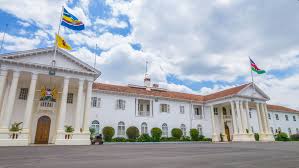
Kenyan Lawmakers Question State House Budget Amid Economic Hardship » Capital News
NAIROBI, Kenya, May 16 – Members of Parliament have raised concerns over State House’s budget following revelations it plans to spend Sh7.9 billion on recurrent expenditure in the 2024/2025 financial year.
Lawmakers criticized the proposed expenditure at a time taxpayers are facing economic difficulties, and the government aims to reduce the wage bill burdening Kenyans.
Documents presented to the National Assembly Committee on Administration and Internal Security on Thursday show that out of a total budget allocation of Sh9.4 billion, Sh7.9 billion will be spent on recurrent expenditure, with Sh1.5 billion allocated for development expenditure.
MPs expressed serious concerns about the recurrent expenditure, which includes wages, salaries, purchases of goods and services, and general consumption, suggesting possible fund wastage.
“The indication of the recurrent expenditure alone is roughly Sh8 billion, equivalent to the Judiciary’s recurrent expenditure. What can we do to enable the President to have more funds for other necessary priorities apart from this?” asked Homa Bay Town MP Peter Kaluma.
State House Comptroller Katoo ole Metito admitted that recurrent expenditure had increased significantly over the years, primarily due to wages and the purchase of goods and services.
He explained that since President William Ruto took office, his administration has hosted several heads of state and delegations to build support for his government.
“Our biggest challenge is recurrent expenditure, mainly for hospitality. The number of delegations His Excellency has been hosting since he took office, both continentally and regionally, has been substantial,” Metito said. “Every year, we host no fewer than ten heads of state. The initial years of setting up an administration are costly, but the President is committed to reducing these costs.”
It emerged that President Ruto was aware of the rising recurrent expenditure, prompting him to summon the four accounting officers at the state agency to discuss cutting unnecessary expenses.
“We were summoned as the accounting officers of the presidency, and the President was very keen on us leading by example to reduce costs. We were instructed to delay projects that were not urgent,” Metito remarked.
In the current financial year’s supplementary budget, which is yet to be approved, State House is seeking an additional Sh1.5 billion, with the majority going to recurrent expenditure. The breakdown indicates Sh300 million for personal emoluments and Sh1.2 billion for operations and maintenance.
Kisumu West MP Rosa Buyu criticized Statehouse for overspending on recurrent expenditure, undermining government austerity measures.
“We have various state departments and agencies unable to function due to budget cuts. Since we are all trying to live within our means, kindly be considerate and make use of the funds you have; it is sufficient,” she stated.
Metito explained that much of the supplementary budget was for personnel who were not onboard when the initial budget was passed, and their confirmation at the Public Service Commission took over six months.
State House Renovations
Details reveal that State House has embarked on 13 projects estimated to cost Sh11.5 billion, including the construction and renovation of Statehouse and lodges, started in 2015 and slated to end in 2027.
In the current financial year, Sh1.5 billion has been allocated for these projects, with Sh250 million for Nairobi Statehouse, Sh240 million for Mombasa Statehouse, and Sh200 million for Nakuru State Lodge.
For 2024/2025, allocations include Sh35 million for Sagana State Lodge, Sh125 million for Eldoret State Lodge, Sh14.9 million for Kisumu State Lodge, Sh15 million for Kakamega State Lodge, and Sh19 million for Kisii State Lodge.
Additional allocations include Sh5 million for Mtito Andei State Lodge, Sh500 million for construction and other civil works, Sh100 million for ICT networking and communication equipment, and Sh50 million for specialized plant, equipment, and machinery.
Kaluma questioned whether some renovations, which are not urgent, could be halted to redirect funds to other state agencies needing development funds.
“How far are the works? In every budget, whether supplementary or main, the renovation budget for statehouses includes tens of millions allocated. I doubt whether this is prudent. You can’t be renovating at this rate even in your own houses,” Kaluma said.
“Knowing the situation of the economy, what reductions can be made in this renovation amount, or which projects can be halted so that other state agencies can run on development?” he added.
Statehouse Comptroller Metito explained that the prolonged completion of renovations was linked to delayed exchequer releases.
“Yes, it’s true these renovations can almost translate into new projects. When funds for routine maintenance are slashed in revised budgets, it affects the timeline,” Metito said. “If all funds are released as required, the budget would not carry over to the next financial year.”
